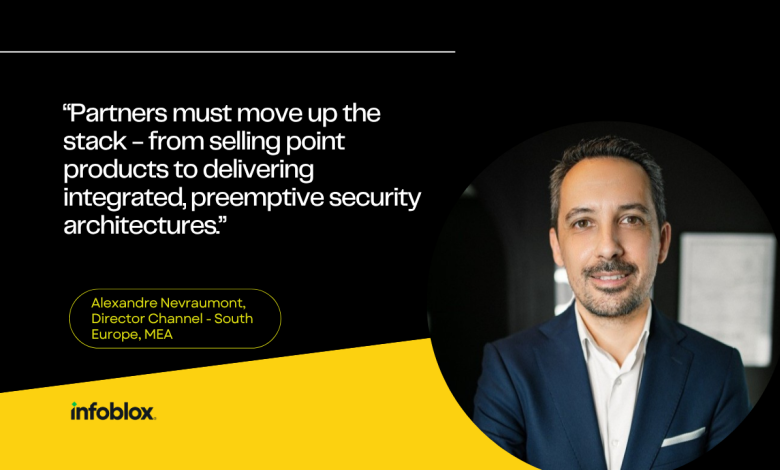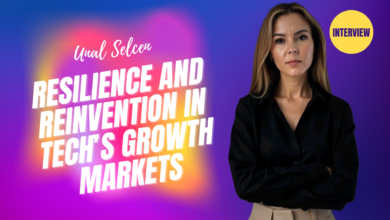“Stay Close to the Customer”

Alexandre Nevraumont, the Director of Channel for South Europe, Middle East & Africa at Infoblox, says, partners who can unify visibility across DNS, DHCP, and IPAM – all while layering in preemptive security – are in high demand
Could you share an overview of your career path to date, highlighting the pivotal moments or achievements that have shaped your leadership within the IT channel?
My expertise is rooted in over 20 years of experience in the IT industry, with a strong focus on building and evolving partner ecosystems for leading software vendors. I began my career with a global system integrator and later an international IT distributor – experiences that gave me a deep understanding of how partners operate, what drives their success, and how to align with their strategic priorities.
I then transitioned to a more cybersecurity focused role, where I helped scale mature partner programs and navigate ecosystem transformation during major industry shifts. I’ve also worked with high-growth startups in data analytics and cloud security, where I saw firsthand how critical it is to have robust partner programs and incentive models to build long-term, profitable alliances. These diverse experiences have shaped my belief that a successful channel strategy is not just about scale – it’s about trust, enablement, and shared growth.
As a key channel influencer within your company, what are your primary roles and responsibilities in shaping strategy, driving engagement, and fostering growth within the partner ecosystem?
At Infoblox, my role centres on enabling our partners to lead with confidence in a fast-changing security landscape. That means designing programs that are simple, profitable, and aligned with how partners sell today. I work closely with our regional teams to localize our go-to-market strategy, support enablement, and ensure partners have the tools and insights they need to succeed. But it’s not just about execution, it’s also about foresight. As a leader in DNS, DDI, and security, we have a responsibility to help partners anticipate what’s next. Whether it’s the rise of AI, the shift to hybrid cloud, or evolving threat vectors, we aim to guide our ecosystem toward the trends that matter most – so they’re not just reacting to change, but leading it.
How would you assess the current health and evolution of the IT channel, particularly within our region? What significant trends or shifts are you observing?
The channel is undergoing a transformation – from transactional resellers to strategic advisors. In the Middle East, we’re seeing a surge in demand for integrated, cloud-native security solutions. Partners are evolving into managed service providers and security consultants, especially as customers grapple with hybrid environments and AI-driven threats. The most successful partners are those who can bridge networking and security for a holistic service experience – exactly where Infoblox plays.
What do you see as the single biggest challenge facing the IT channel in the region today, and conversely, what is the most significant untapped opportunity for partners?
The biggest challenge? Complexity. Customers are overwhelmed by fragmented tools and shifting threat landscapes. The opportunity? Becoming the simplifier. Partners who can unify visibility across DNS, DHCP, and IPAM – all while layering in preemptive security – are in high demand. Our solutions enable partners to offer that clarity and control, helping customers reduce risk and operational overhead.
In your opinion, what are the most effective strategies partners can employ to drive sustainable growth and profitability in the current market, especially considering evolving customer demands?
To thrive in today’s market, partners must embrace the cloud-first reality. In the Middle East especially, we’re seeing a rapid rise in hyperscaler presence – AWS, Microsoft Azure, and Google Cloud are reshaping how customers architect their IT environments. This shift demands a new kind of partnership: one that’s built on co-selling, cloud-native integration, and hybrid infrastructure expertise. The most successful partners will be those who understand this model and can align with CSPs to deliver joint value. At the same time, partners must double down on specialisation (whether in verticals, security, or automation) and build services that go beyond resale. The future belongs to those who can combine technical depth with strategic collaboration.
How is the rapid advancement of AI, including Agentic AI and Generative AI, fundamentally reshaping the channel’s business models, partner opportunities, and the skill sets required for success?
AI is redefining what it means to be a channel partner. It’s no longer just about reselling – it’s about advising, integrating, and automating. Agentic AI, in particular, is enabling partners to build autonomous workflows that enhance every step, from prospecting to roll-out. That’s a huge shift. It means partners need to invest in data science, orchestration, and vertical-specific AI use cases. We might see new partner types emerge – AI-native MSPs, automation-first integrators, and even boutique firms focused solely on AI governance. The opportunity is massive, but so is the need to upskill. The partners who embrace AI as a business enabler (not just a buzzword) will be the ones who lead the next wave of channel transformation.
Given the escalating sophistication of cyber threats, how can channel partners best position themselves to deliver comprehensive cybersecurity solutions, moving beyond traditional offerings to address emerging risks like AI evasion?
Partners must move up the stack – from selling point products to delivering integrated, preemptive security architectures. Infoblox’s solutions block threats before they land, using DNS intelligence and machine learning to detect malicious behaviors before they become a problem. Partners who can articulate and deliver that value – especially in sectors like healthcare and finance – are seeing strong traction. The key is to lead with visibility and control, not just alerts.
Environmental, Social, and Governance (ESG) factors and sustainability are gaining prominence. How can channel partners integrate these principles into their operations and offerings to create competitive advantages and meet evolving client expectations?
ESG is no longer a checkbox – it’s a differentiator. Partners can stand out by aligning with vendors who prioritize sustainability, like Infoblox.
What advice do you have for channel partners on attracting, developing, and retaining top talent, particularly in areas like AI, cloud security, and specialized industry solutions?
Talent is the engine of innovation and in today’s market, it’s also a competitive differentiator. That’s why we created the Infoblox Expert Club: an invitation-only community for our most committed partners and their technical champions. It goes beyond traditional training. Members gain deep expertise in DNS, DHCP, and IPAM security, share real-world challenges, and collaborate on best practices. It’s a space for continuous learning, peer exchange, and advanced enablement. For partners, investing in this kind of technical depth is essential – not just to meet customer expectations, but to lead with authority in complex environments. Attracting and retaining top talent starts with creating a culture of mastery and giving your teams a reason to stay curious.
How do you see the roles of different partner types—such as Managed Service Providers (MSPs), Independent Software Vendors (ISVs), and system integrators—evolving, and how can they best collaborate to deliver integrated solutions?
The lines are blurring. MSPs are becoming MSSPs. ISVs are embedding security into their apps. Integrators are building platforms. The future is collaborative. We’re seeing success when partners co-create solutions. Our job is to make those integrations seamless and support joint go-to-market efforts.
Drawing from your experience and looking ahead, what is your most crucial piece of advice for partners seeking long-term success and relevance in this rapidly transforming IT channel?
Stay close to the customer – but even closer to the change. The IT channel is evolving fast, and the partners who succeed will be those who adapt faster than the market. That means embracing new business models, investing in skills, and aligning with strategic forces like cloud transformation. Hyperscalers are no longer just vendors; they’re co-innovation platforms. Partners who learn to co-sell, co-build, and co-market with them will unlock new revenue streams and long-term relevance. My advice: Don’t wait for the future to arrive. Build it deliberately, collaboratively, and with a clear eye on where your customers are headed.




